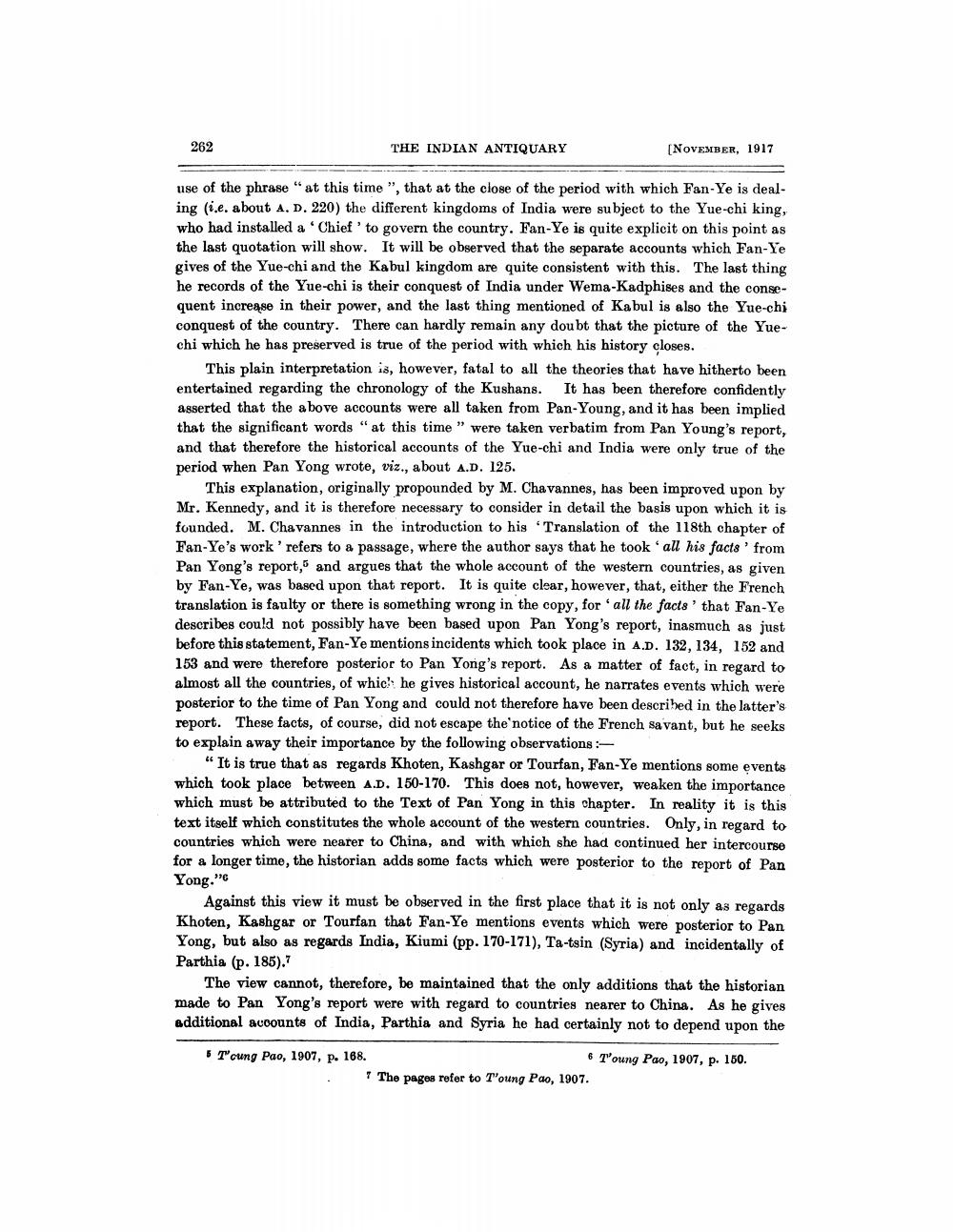________________
262
THE INDIAN ANTIQUARY
NOVEMBER, 1917
use of the phrase "at this time”, that at the close of the period with which Fan-Ye is dealing (.e. about A. D. 220) the different kingdoms of India were subject to the Yue-chi king, who had installed a 'Chief' to govern the country. Fan-Ye is quite explicit on this point as the last quotation will show. It will be observed that the separate accounts which Fan-Ye gives of the Yue-chi and the Kabul kingdom are quite consistent with this. The last thing he records of the Yue-chi is their conquest of India under Wema-Kadphises and the consequent increase in their power, and the last thing mentioned of Kabul is also the Yue-chi conquest of the country. There can hardly remain any doubt that the picture of the Yuechi which he has preserved is true of the period with which his history closes.
This plain interpretation is, however, fatal to all the theories that have hitherto been entertained regarding the chronology of the Kushans. It has been therefore confidently asserted that the above accounts were all taken from Pan-Young, and it has been implied that the significant words "at this time" were taken verbatim from Pan Young's report, and that therefore the historical accounts of the Yue-chi and India were only true of the period when Pan Yong wrote, viz., about A.D. 125.
This explanation, originally propounded by M. Chavannes, has been improved upon by Mr. Kennedy, and it is therefore necessary to consider in detail the basis upon which it is founded. M. Chavannes in the introduction to his Translation of the 118th chapter of Fan-Ye's work ' refers to a passage, where the author says that he took all his facts' from Pan Yong's report, and argues that the whole account of the western countries, as given by Fan-Ye, was based upon that report. It is quite clear, however, that, either the French translation is faulty or there is something wrong in the copy, for all the facts' that Fan-Ye describes could not possibly have been based upon Pan Yong's report, inasmuch as just before this statement, Fan-Ye mentions incidents which took place in A.D. 132, 134, 152 and 153 and were therefore posterior to Pan Yong's report. As a matter of fact, in regard to almost all the countries, of which he gives historical account, he narrates events which were posterior to the time of Pan Yong and could not therefore have been described in the latter's report. These facts, of course, did not escape the notice of the French savant, but he seeks to explain away their importance by the following observations:
"It is true that as regards Khoten, Kashgar or Tourfan, Fan-Ye mentions some events which took place between A.D. 150-170. This does not, however, weaken the importance which must be attributed to the Text of Pan Yong in this chapter. In reality it is this text itself which constitutes the whole account of the western countries. Only, in regard to countries which were nearer to China, and with which she had continued her intercourse for a longer time, the historian adds some facts which were posterior to the report of Pan Yong."
Against this view it must be observed in the first place that it is not only as regards Khoten, Kashgar or Tourfan that Fan-Ye mentions events which were posterior to Pan Yong, but also as regards India, Kiumi (pp. 170-171), Ta-tsin (Syria) and incidentally of Parthia (p. 185).7
The view cannot, therefore, be maintained that the only additions that the historian made to Pan Yong's report were with regard to countries nearer to China. As he gives additional acoounts of India, Parthia and Syria he had certainly not to depend upon the
• TỶcung Pao, 1907, p. 188.
6 Toung Pao, 1907, p. 150. The pages refer to T'oung Pao, 1907.




